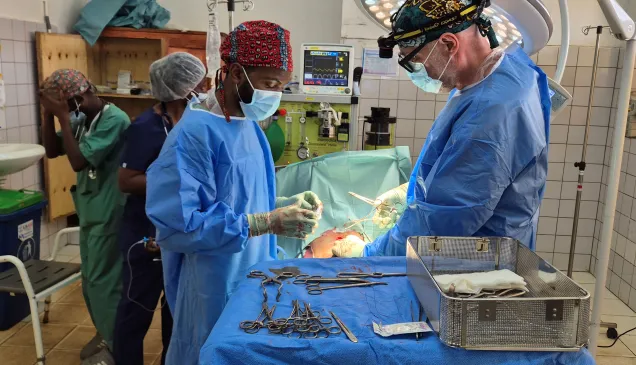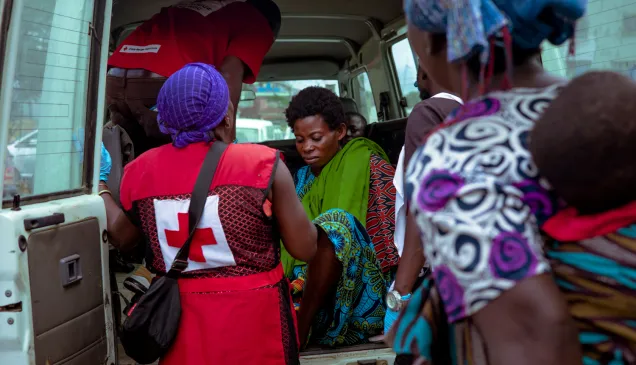DR Congo: Displaced people and host communities struggle to obtain essentials in North Kivu
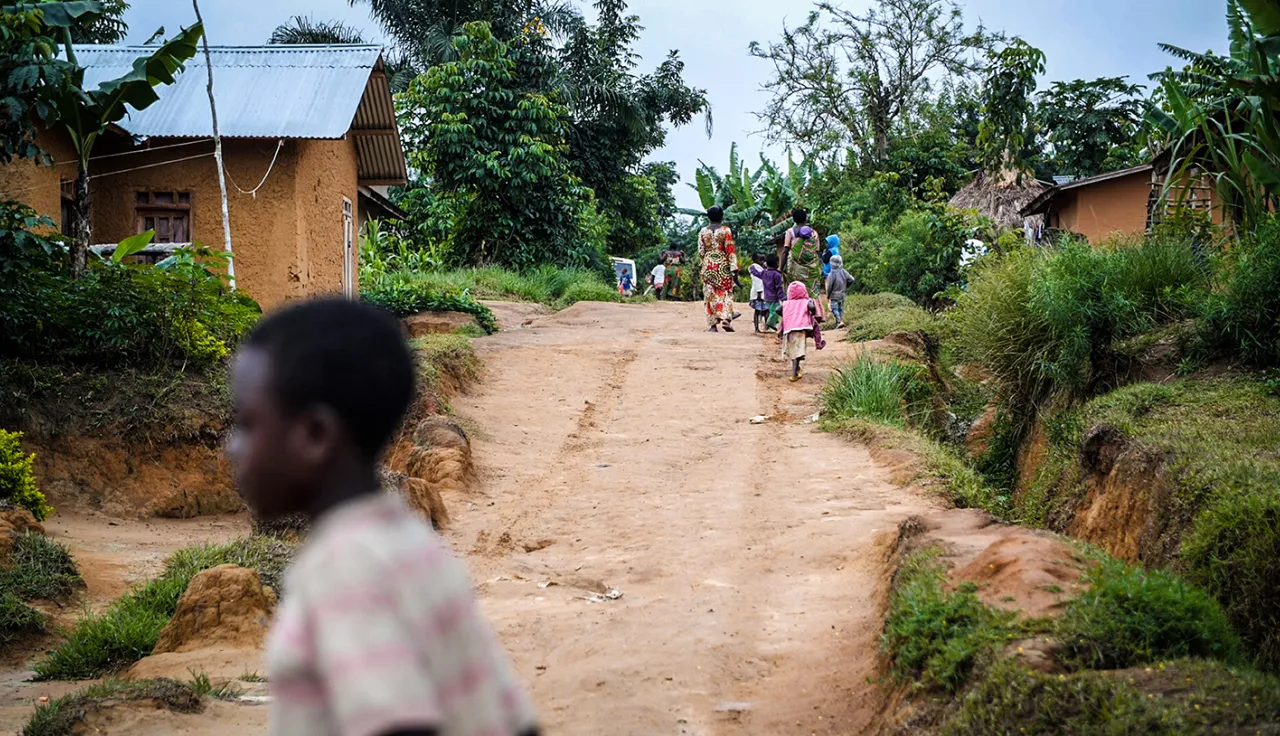
Kinshasa (ICRC) – Since the start of 2023, an escalation in the fighting between armed groups in North Kivu province has displaced some 600,000 people*. Our teams in the field have observed an increased need for humanitarian aid, both among displaced people and the communities that host them. The worsening security situation is also making it difficult to deliver aid to the areas most affected by the violence.
According to the United Nations, only 18 per cent of people who fled their homes in North Kivu province over the last six months are living in dedicated camps or shelters, while the remaining 82 per cent live with host families. This is true in Oicha, a rural community of 360,000 inhabitants located north of the city of Beni.
For a decade, people in North Kivu have been caught in the crossfire between local armed groups, the Allied Democratic Forces (ADF) and joint Congolese–Ugandan military operations against the ADF. An estimated 165,000 people have fled to Oicha. Designated shelters, originally intended to house 5,700 people, are currently overflowing with some 7,200 residents, according to Oicha's displaced persons committee. The rest depend on the local community for shelter, food and water.
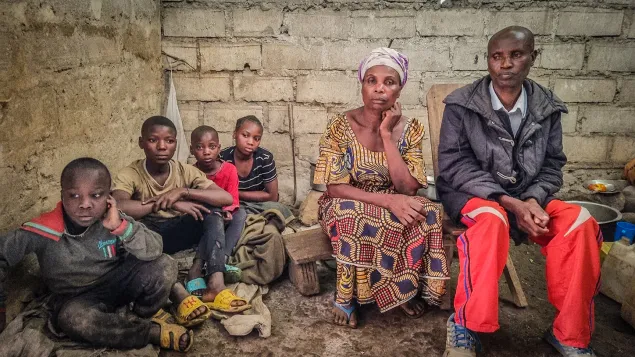
Mukandirwa Balanda Hangi, displaced from Kichanga, with his wife and eight children. Since the end of February 2023, they have been living in a house, still under construction, provided by his cousin.
Imelde Kavira Shaonere, a 55-year-old woman who has been in Oicha for a year, described her gruelling experience: "I fled with my grandchildren and other children who had lost their parents during the fighting. There are 20 of us living in a house that I rent for 24,000 Congolese francs (10 US dollars) a month. I don't have a job. I've already been asked to move out because I have no money. Food, water and health care are all hard to come by. We're suffering terribly."
In late June 2023, the ICRC launched two well-drilling projects to improve access to drinking water. Several water taps will supply water to designated shelters and the densely populated neighbourhoods where the majority of displaced families live. As of August 2023, the ICRC is also supporting the Mbimbi health centre and Oicha's general hospital – where urgent cases are referred from the health centre – thus providing access to free care for nearly 24,000 people.
When the poor help the poor
The situation is similar in Rutshuru and Masisi territories to the south, two agricultural areas that feed the city of Goma. Fighting between the armed branch of the March 23 Movement (M23) and other armed groups displaced at least 78,000 people in June and July of 2023. In Nyabiondo alone, more than 7,800 people** have joined the 2,000 who arrived in February. The local community, themselves suffering from the fighting and a lack of resources, have been forced to share what little they have.
"I took in seven displaced families with no blood relation to me. When they first arrived, I gave them bananas to eat. But after three days, I had to tell them to fend for themselves," said Kengo Lukoo Bandu, a farmer in his 40s and a father of nine in Nyabiondo.
"The economic situation has changed for our community. What little food we had is no longer enough. Prices have also gone up at the market. Before, my family would go through ten cups of rice a day. Now we only have half that."
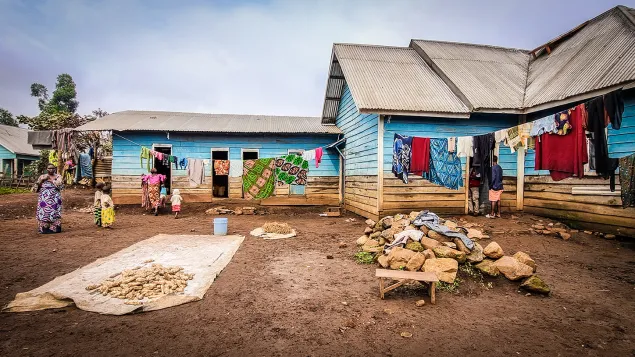
View of part of the reception center built a few years ago by Kengo Lukoo Bandu. Since the end of February 2023, this farmer has been providing free accommodation for seven displaced families.
Tens of thousands of people in North Kivu – both the displaced and the host community – are in urgent need of help. Meanwhile, humanitarian organizations face a lack of financing and restricted access to these communities. Anne-Sylvie Linder, head of the ICRC subdelegation in Goma, urged donors to continue supporting the various humanitarian groups that are active in the region.
"We have to think beyond emergency response to how we can finance and implement long-lasting solutions. The parties to the conflicts in North Kivu must also fulfil their obligations under international law. Humanitarian organizations must have unconditional access to civilian communities in need. The current situation is dire, and humanitarian aid has to reach the thousands of families in remote areas who desperately need it."
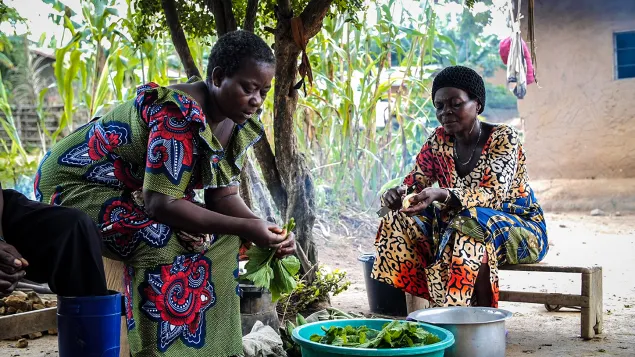
"This food was given to us by a generous neighbor. When it's not enough, only the children eat and adults have no choice but get over the hunger” says Eva Kalendi Kavira (left).
Our activities in North Kivu (first half of 2023)
Protection of family links, in partnership with the DRC Red Cross
- 108 children were reunited with their families in Beni, Goma, Lubero, Masisi, Nyiragongo, Rutshuru and Walikale territories.
- 82,639 free phone calls were organized for separated family members in displaced persons camps in Goma and Nyiragongo territories.
Assistance for children formerly associated with/exposed to recruitment by armed groups
- 10 children (three girls and seven boys) were provided with school supplies so they could resume their studies in Pinga.
- 19 children (three girls and 16 boys) in Kanyabayonga received socioeconomic aid in the form of cash assistance provided to their parents.
- 15,722 children (5,821 of them girls) in high-risk communities took part in recruitment-prevention activities and games (in partnership with the DRC Red Cross at nine sites).
Food and financial assistance, in partnership with the DRC Red Cross
- 39,810 people (displaced and local) living in Sake, Masisi territory, received food assistance, and 30,990 received essential household items.
- 180 people (displaced and local) living in Luofu, southern Lubero territory, were provided with fish larvae and equipment to restore fish farms.
- 456 victims of sexual violence and other violence in Beni and Masisi territories received financial support to launch microeconomic initiatives.
- 264 victims of sexual violence and other violence living in Beni, Nyiragongo and Rutshuru territories received financial assistance to meet urgent needs.
- 5,400 people (displaced from North Kivu and local host families) living in Kalehe territory, South Kivu province, received financial assistance to buy essential household items.
Health
- 651 weapon-wounded patients were treated at Beni general hospital (202 patients) and Bethesda/Ndosho hospital in Goma (449 patients).
- 75 tonnes of medical supplies from the provincial health authorities were transported by ICRC truck from Goma to the health zones of Rutshuru, Rwanguba and Binza.
- 29 sets of equipment to stabilize wounded patients and three sets of health emergency supplies were donated to 20 health facilities: four in Rutshuru, three in Masisi, two in Goma, five in Oicha, four in Lubero and two in Butembo.
- Surgical supplies, wound-stabilization equipment and other medical supplies for treating wounded patients were donated to Katindo military hospital and the national police hospital in Goma.
- Medical supplies and financial assistance were provided to Rwanguba general hospital in Rutshuru territory (February), Kanyabayonga referral health centre (March and May) and Cepromi referral health centre (March and June).
- 72,500 people gained better access to health care through support to four health facilities in Masisi and Walikale territories.
- 47,000 people gained better access to health care in Oicha through support to Mavivi referral health centre, Mbimbi health centre and Oicha general hospital.
Water and sanitation
- 145,000 displaced people living in camps in Bulengo and Rusayo, near Goma, and 87,500 people staying with host families in four neighbourhoods of Goma gained access to drinking water thanks to improvements and extensions to the water supply system of a private distributor.
- 15,000 displaced people living in camps in Rumangabo, Rutshuru territory, gained access to drinking water thanks to extensions to the water supply system and two new water fountains.
- 36,000 displaced people living in five camps in Nyiragongo territory were brought drinking water daily by truck from November 2022 to March 2023. Three new sanitary facilities were also built in the camps, comprising 40 latrines, and two older facilities comprising 14 latrines were repaired or rebuilt.
- 5,400 litres of fuel have been provided to the Kabaya pumping station since the second half of 2022 so that it can continue to supply water to Kabaya and Rumangabo in Rutshuru territory.
- 15,000-litre bladder tank was installed on a platform at Bethesda/Ndosho hospital in Goma (200 beds) to improve the hospital's drinking water supply.
- 4,422 people (returned after displacement and host families) living in the village of Oninga, Walikale territory, were given essential household items (plastic buckets and containers).
- 1,243 displaced people living in a camp in Kanyabayonga and in the village of Burangiza, Beni territory, gained access to drinking water through a water supply project.
- A maternity ward, private interview room for victims of sexual violence, medical sterilization unit, septic tank, soakaway/dry well and solar panels were added to the Linzo health centre in Beni territory.
*Source: United Nations Office for the Coordination of Humanitarian Affairs (OCHA)
**Source: Nyabiondo displaced persons committee
For more information
Francine Kongolo, fkongolo@icrc.org - +243 (0) 81 992 23 28
Lucien Christen, lchristen@icrc.org - +221 78 186 46 87

